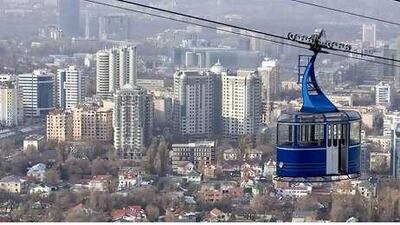Given a choice between a sukuk or a plain-vanilla eurobond, most countries outside the Middle East and certain parts of South East Asia would tend to take the western option. But not Kazakhstan. Last month, the emerging central Asian oil giant dropped plans to issue a US$750 million (Dh2.75 billion) eurobond, while proceeding with plans to issue a $500m Islamic bond - its first sovereign issuance in a decade.
"They didn't need both the eurobond and the sukuk, and given the choice the sukuk was the preferred offer," says Prasad Abraham, the chief executive of the Kazakhstan branch of Abu Dhabi's Al Hilal Bank, which launched in March to promote Islamic finance. Kazakhstan counts itself an Islamic country but its once nomadic people have had a looser interpretation of the faith than elsewhere, and 70 years of suppression during the Soviet Union made the hold of religion in the community weaker still.
So it's perhaps surprising the finance ministry now dreams of making Almaty, the country's commercial capital, the regional centre for Islamic finance for the former Soviet Union. That prospect, rather than any commercial advantage, is what gave the sukuk the edge. "Kazakhstan has set its sights on becoming a regional Islamic finance centre by 2020 and largely to help move in that direction, the government is keen to support and promote Islamic Banking activities wherever possible," says Mr Abraham.
He expects the country's issuance of Islamic bonds to start small, at just $200m this year, before rising to as much as $3bn a year by 2015. Al Hilal, owned by the Abu Dhabi Government, intends to channel about $1bn into Kazakh infrastructure over the next few years. It seems that with Moscow far ahead as a centre for western finance, Kazakhstan was casting around for a specialist field. Bruce Gaston, the chief executive of Skybridge Finance who has long experience in Kazakhstan, believes the eurobond would have made better commercial sense.
"A sukuk would cost up to 150 basis points more than an equivalent eurobond issue, not including the logistical changes required in Kazakhstan's infrastructure," Mr Gaston argues. He is sceptical of the finance minister Bolat Jamishev's talk of a sukuk being issued this year. "One thing the Kazakhs have done well over the years is the execution of their financings," Mr Gaston says. "[The state-owned oil and gas company] KazMunaiGaz's 2008 eurobond won international awards for the quality of execution. They are not going to rush into sukuks until they are ready to issue them successfully and in volume."
Mr Abraham says preparations for the sukuk are fairly well advanced but he concedes it is unlikely to be completed until next year. For a start, the return of the oil price until recently to above $80 has removed much of the urgency. In 2008, the country's financial situation was rocky. Three of its main banks hit cash crises and had to be propped up with equity injections from Samryk-Kazyna, the state sovereign wealth fund, and this year international lenders were forced to accept substantial write-downs.
In the months before the Gulf was hit by the economic downturn, Kazakhstan looked to Dubai and Abu Dhabi for help but eventually it was bailed out with a $10bn loan from China. Now the Kazakh government is looking flush. It received a $1bn loan from the World Bank in May, leading it to drop the eurobond. So there is little hurry. A private Kazakh company may well issue a sukuk before the government does.
Mr Abraham says he has been surprised at how many of Kazakhstan's businessmen would prefer to borrow in a way that's consistent with Islamic law. "There's a reasonably sized group of borrowers who did not avail of regular bank financing in the past because they didn't believe in it," he says. "We knew that such a body existed but it's far larger than we expected and some of them are the principal shareholders of major companies."
The Gulf's Islamic finance houses had no clue about this pool of willing central Asian oligarchs during the sukuk craze of a few years back. Perhaps if they had, these billionaires' privileged access to capital-intensive but highly bankable oil and mining projects would have made Kazakhstan an Islamic finance hotspot even then. business@thenational.ae

